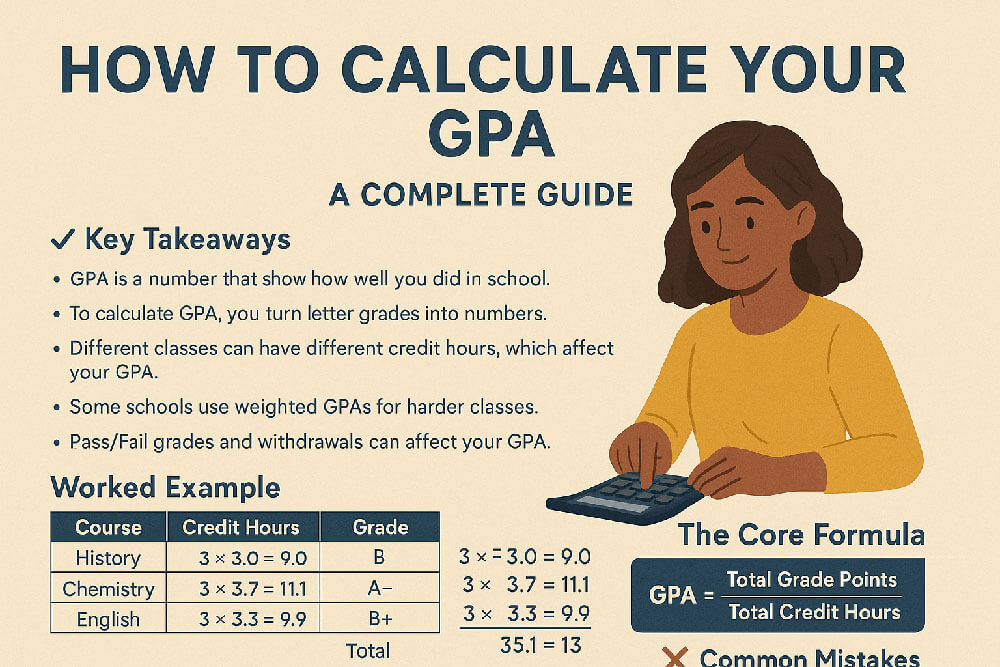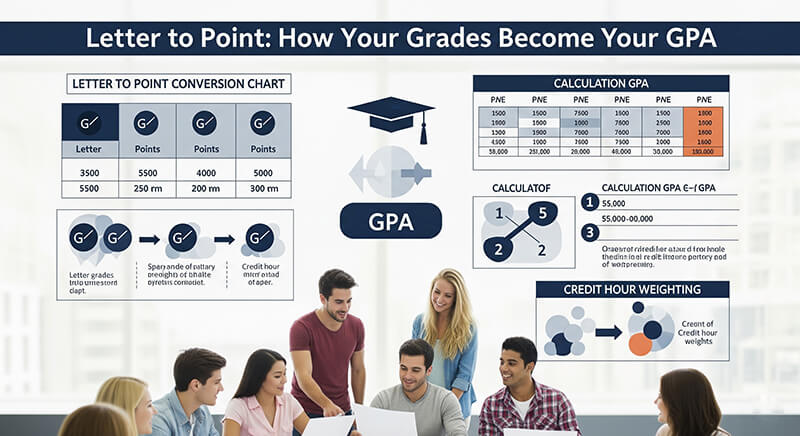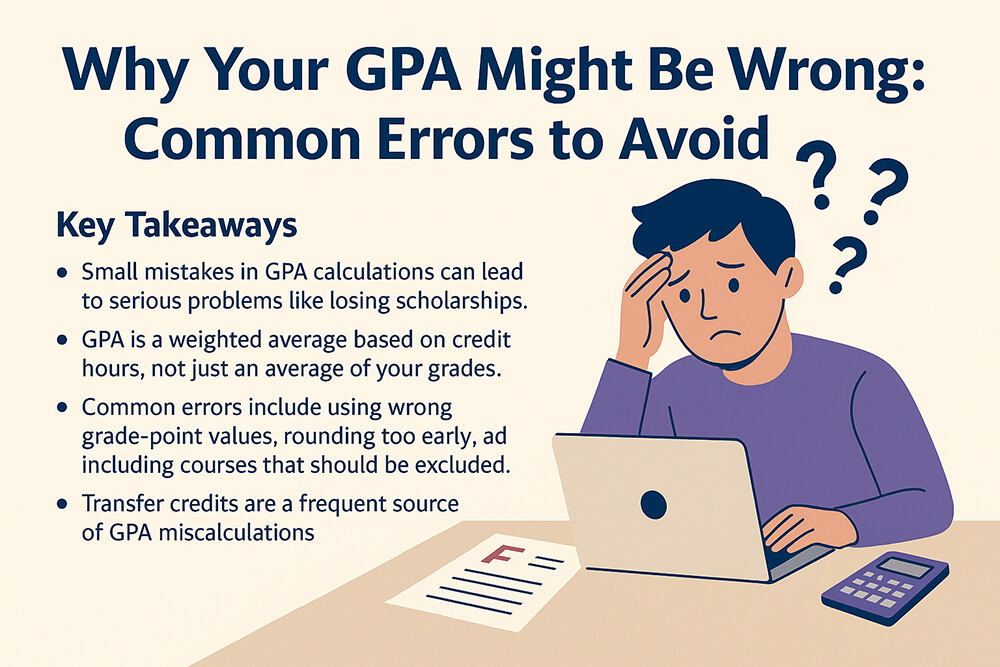Key Takeaways
| Feature | Description | Why It Matters |
|---|---|---|
| Definition | A Last-60-Credits GPA is your grade point average from only the last 60 credit hours of your undergraduate degree. | Graduate schools and employers use it to see your most recent and relevant academic performance. |
| Calculation | You calculate it by taking the grades from your last 60 credit hours and finding the average. | This shows your skill in upper-level courses, which is a good sign of future success. |
| Importance | It highlights growth and improvement, especially if you had a slow start in college. | A strong recent GPA can be more important than your overall cumulative GPA for admissions and honors. |
| Usage | It is mainly used for graduate school applications, scholarships, and academic honors like the Dean's List. | Many programs have a minimum GPA requirement based on these credits. |
What Is a Last-60-Credits GPA?
A Last-60-Credits GPA shows your grades from your most recent classes. It usually covers your junior and senior years of college. This number tells a story about your latest work. Graduate schools look at this GPA to see how well you handle advanced courses. It gives them a clear picture of your current academic skills. You can use a simple tool from The GPA Calculator to find this number. Learning how to calculate your GPA is the first step.
Why Your Last 60 Credits Matter
Your last 60 credits show your growth as a student. A strong GPA in your final two years proves you can succeed in difficult subjects. This is very important for graduate school applications. It can also help you qualify for academic awards. For example, many schools have a Dean's List eligibility checker that looks at recent semester performance. Your early college grades matter less if you show great improvement. A freshman year GPA predictor can show your starting point, but your recent GPA shows where you finished.
How to Use a Last-60-Credits GPA Calculator
Using a calculator for your last 60 credits is easy. First, get your official school transcript. This paper lists all your courses and grades. Next, find your most recent 60 credit hours. Start from your last semester and work backward. Then, enter the grades and credit hours for those courses into the calculator. A GPA formula guide can help you understand the math behind it. A regular transcript GPA audit guide ensures your information is accurate before you begin.
Understanding the Core Components of GPA
To calculate your GPA, you need to know about quality points and credit hours. Each letter grade has a point value. An 'A' is usually 4 points, a 'B' is 3, and so on. The number of credit hours for a course shows how much it is worth. A 4-credit class has more weight than a 2-credit class. Our guide on quality points vs. GPA explained makes this simple. You can also use a credit hour weighting GPA guide to see how it works. Converting grades correctly is also key, and a letter to point GPA conversion guide is a helpful tool.
Handling Special Cases in Your Calculation
Sometimes, your transcript has special grades. These can include transfer credits or pass/fail classes. A transfer credits GPA integrator helps you include courses from other schools. If you are in two programs, a dual-degree GPA splitter can separate your grades. It is important to know how pass/fail grades impact your GPA, as they often do not count toward your GPA. If you retook a class, a repeat course GPA recalculator will help you find your new average.
Weighted vs. Unweighted GPA in Your Last 60 Credits
Your GPA can be weighted or unweighted. An unweighted GPA uses a standard 4.0 scale. A weighted GPA gives more points for harder classes, like Honors or AP courses. Many high schools use weighted grades, and it is good to know the difference. The guide on weighted vs. unweighted GPA explains this clearly. A GPA weighting guide for Honors and AP shows you how these classes can boost your score. You can explore weighted GPA myths debunked to learn more. A weighted vs. unweighted GPA calculator can calculate both for you.
Advanced GPA Concepts and Conversions
Different schools use different systems. Some schools use trimesters instead of semesters. A trimester GPA calculator is built for that system. School districts may also have unique rules, and you can learn how school districts calculate GPA. Some scales go higher than 4.0. A 5.0 GPA scale guide explains how that works. For students in special programs, an IB to GPA conversion guide is very useful for accurate calculations.
Avoiding Common GPA Calculation Mistakes
People often make small mistakes when calculating their GPA. These errors can change the final number. A guide on common GPA calculation errors to avoid can help you be more accurate. Forgetting to weigh credit hours is a frequent mistake. Another is mixing up weighted and unweighted scales. Understanding GPA inflation vs. deflation can also provide context for how your GPA is viewed. Being careful helps you get the right number every time.
GPA Calculators for All Students
GPA tools are useful for every student, not just those applying to grad school. A high school GPA calculator helps younger students track their progress from the start. These tools make it easy to see where you stand. They help you set goals for the future. Whether you are a freshman or a senior, a GPA calculator is a great resource for academic planning.
Frequently Asked Questions (FAQ)
1. What is a last-60-credits GPA? A last-60-credits GPA is the average of your grades from your final 60 credit hours of undergraduate study, which typically covers your junior and senior years.
2. Why do schools look at the last 60 credits? Schools and graduate programs look at the last 60 credits to see your performance in more advanced, upper-level courses. It shows your current academic ability and potential for success in a graduate program.
3. How do I find my last 60 credits? You can find your last 60 credits by reviewing your official academic transcript. Start with your most recent semester and work backward, adding up the credit hours until you reach 60.
4. Does a last-60-credits GPA calculator work for graduate credits? Yes, the calculation method is the same. You would use the grades and credit hours from your last 60 credits of graduate-level coursework to find your GPA.









